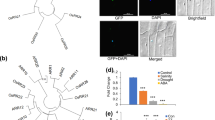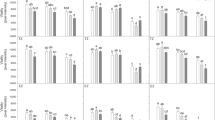Abstract
The rolC (root locus C) gene from Agrobacterium rhizogenes belongs to the family of plast oncogenes causing significant changes in plant growth and morphology. The overexpression of the rolC provokes the suppression of reactive oxygen species (ROS) generation and reinforces stress tolerance in transgenic cells. In this study, we tested whether this effect is associated with changes in the expression of oxidative and antioxidative enzymes such as NADPH oxidase (termed respiratory burst oxidase homologs; RBOH), superoxide dismutase, catalase, and ascorbate peroxidase. The expression of genes, encoding RcRBOHs and AtRBOHs, the major producers of ROS, was two times lower in both Rubia cordifolia and Arabidopsis thaliana rolС-expressing cultures. Temperature and salt stresses induced expression of Rboh genes, yet this effect was significantly less evident in transgenic calli. The mRNA transcript abundance of most of the antioxidant genes was strongly inhibited in rolC-expressing cultures under normal conditions. However, expression levels of antioxidant enzymes were 1.5 times higher in transgenic calli compared to the control under tested abiotic stresses. Our results indicate that RolC specifically regulates NADPH oxidase and antioxidant genes expression to suppress ROS production. In summary, these effects result in an increased tolerance of rolC-expressing cells to abiotic stress conditions.





Similar content being viewed by others
Data Availability
The datasets generated during and/or analysed during the current study are available from the corresponding author on reasonable request.
References
Ancillotti C, Bogani P, Biricolti S, Calistri E, Checchini L, Ciofi L, Gonnelli C, Del Bubba M (2015) Changes in polyphenol and sugar concentrations in wild type and genetically modified Nicotiana langsdorffii Weinmann in response to water and heat stress. Plant Physiol Biochem 97:52–61. https://doi.org/10.1016/j.plaphy.2015.09.012
Baxter A, Mittler R, Suzuki N (2014) ROS as key players in plant stress signaling. J Exp Bot 65:1229–1240. https://doi.org/10.1093/jxb/ert375
Bulgakov VP, Aminin DL, Shkryl YN, Gorpenchenko TY, Veremeichik GN, Dmitrenok PS, Zhuravlev YN (2008) Suppression of reactive oxygen species and enhanced stress tolerance in Rubia cordifolia cells expressing the rolC oncogene. Mol Plant Microbe Interact 21:1561–1570. https://doi.org/10.1094/MPMI-21-12-1561
Bulgakov VP, Gorpenchenko TY, Veremeichik GN, Shkryl YN, Tchernoded GK, Bulgakov DV, Aminin DL, Zhuravlev YN (2012) The rolB gene suppresses reactive oxygen species in transformed plant cells through the sustained activation of antioxidant defense. Plant Physiol 158:1371–1381. https://doi.org/10.1104/pp.111.191494
Chang YL, Li WY, Miao H, Yang SQ, Li R, Wang X, Li WQ, Chen KM (2016) Comprehensive genomic analysis and expression profiling of the NOX gene families under abiotic stresses and hormones in plants. genome Biol Evol 8:791–810. https://doi.org/10.1093/gbe/evw035
Dilshad E, Cusido RM, Ramirez Estrada K, Bonfill M, Mirza B (2015) Genetic transformation of Artemisia carvifolia Buch with rol genes enhances artemisinin accumulation. PLoS ONE 10:e0140266. https://doi.org/10.1371/journal.,pone.0140266
Dilshad E, Ismail H, Haq I, Cusido R, Palazon J, Ramirez-Estrada K, Mirza B (2016) Rol genes enhance the biosynthesis of antioxidants in Artemisia carvifolia Buch. BMC Plant Biol 16:125. https://doi.org/10.1186/s12870-016-0811-7
Eiamphungporn W, Nakjarung K, Prapagdee B, Vattanaviboon P, Mongkolsuk S (2003) Oxidant-inducible resistance to hydrogen peroxide killing in Agrobacterium tumefaciens requires the global peroxide sensor-regulator OxyR and KatA. FEMS Microbiol Lett 225:167–172. https://doi.org/10.1016/S0378-1097(03)00511-1
Estruch JJ, Parets-Soler A, Schmülling T, Spena A (1991) Cytosolic localization in transgenic plants of the rolC peptide from Agrobacterium rhizogenes. Plant Mol Biol 17:547–550. https://doi.org/10.1007/BF00040654
Filiz E, Ozyigit II, Saracoglu IA, Uras ME, Sen U, Yalcin B (2019) Abiotic stress-induced regulation of antioxidant genes in different Arabidopsis ecotypes: microarray data evaluation. Biotechnol Biotechnol Equip 33:128–143. https://doi.org/10.1080/13102818.2018.1556120
Ishibashi N, Kitakura S, Terakura S, Machida C, Machida Y (2014) Protein encoded by oncogene 6b from Agrobacterium tumefaciens has a reprogramming potential and histone chaperone-like activity. Front Plant Sci 5:572. https://doi.org/10.3389/fpls.2014.00572
Ismail H, Gillespie AL, Calderwood D, Iqbal H, Gallagher C, Chevallier OP, Elliott CT, Pan X, Mirza B, Green BD (2019a) The health promoting bioactivities of Lactuca sativa can be enhanced by genetic modulation of plant secondary metabolites. Metabolites 9:97. https://doi.org/10.3390/metabo9050097
Ismail H, Kayani SS, Kayani SI, Mirza B, Waheed MT (2019b) Optimization of cell suspension culture of transformed and untransformed lettuce for the enhanced production of secondary metabolites and their pharmaceutical evaluation. 3 Biotech 9:339. https://doi.org/10.1007/s13205-019-1870-x
Kapoor D, Singh S, Kumar V, Romero R, Prasad R, Singh J (2019) Antioxidant enzymes regulation in plants in reference to reactive oxygen species (ROS) and reactive nitrogen species (RNS). Plant Gene 19:100182. https://doi.org/10.1016/j.plgene.2019.100182
Kiani BH, Safdar N, Mannan A, Mirza B (2012) Comparative artemisinin analysis in Artemisia dubia transformed with two different Agrobacteria harboring rol ABC genes. Plant Omics J 5:386–391
Kitakura S, Fujita T, Ueno Y, Terakura S, Wabiko H, Machida Y (2002) The protein encoded by oncogene 6b from Agrobacterium tumefaciens interacts with a nuclear protein of tobacco. Plant Cell 14:451–463. https://doi.org/10.1105/tpc.010360
Kwak JM, Mori IC, Pei ZM, Leonhardt N, Torres MA, Dangl JL, Bloom RE, Bodde S, Jones JD, Schroeder JI (2003) NADPH oxidase AtrbohD and AtrbohF genes function in ROS-dependent ABA signaling in Arabidopsis. EMBO J 22:2623–2633. https://doi.org/10.1093/emboj/cdg277
Ma L, Zhang H, Sun L, Jiao Y, Zhang G, Miao C, Hao F (2012) NADPH oxidase AtrbohD and AtrbohF function in ROS-dependent regulation of Na+/K+homeostasis in Arabidopsis under salt stress. J Exp Bot 63:305–317. https://doi.org/10.1093/jxb/err280
Mardani-Nejad S, Khavari-Nejad RA, Saadatmand S, Najafi F, Aberoomand Azar P (2016) Potent antioxidant properties of rolB-transformed Catharanthus roseus (L.) G. Don. Iran J Pharm Res 15:537–550
Marino D, Dunand C, Puppo A, Pauly N (2012) A burst of plant NADPH oxidases. Trends Plant Sci 17:9–15. https://doi.org/10.1016/j.tplants.2011.10.001
Martin RM, Ter-Avetisyan G, Herce HD, Ludwig AK, Lättig-Tünnemann G, Cardoso MC (2015) Principles of protein targeting to the nucleolus. Nucleus 6:314–325. https://doi.org/10.1080/19491034.2015.1079680
Matveeva TV, Sokornova SV, Lutova LA (2015) Influence of Agrobacterium oncogenes on secondary metabolism of plants. Phytochem Rev 14:541–554. https://doi.org/10.1007/s11101-015-9409-1
Mittler R (2017) ROS are good. Trends Plant Sci 22:11–19. https://doi.org/10.1016/j.tplants.2016.08.002
Mohajjel-Shoja H, Clément B, Perot J, Alioua M, Otten L (2011) Biological activity of the Agrobacterium rhizogenes-derived trolC gene of Nicotiana tabacum and its functional relation to other plast genes. Mol Plant Microbe Interact 24:44–53. https://doi.org/10.1094/MPMI-06-10-0139
Nikravesh F, Khavari-Nejad RA, Rahimian H et al (2012a) Study of antioxidant enzymes activity and isozymes pattern in hairy roots and regenerated plants in Nicotiana tabacum. Acta Physiol Plant 34:419–427. https://doi.org/10.1007/s11738-011-0838-1
Nikravesh F, Khavari-Nejad RA, Rahimian H, Fahimi H (2012b) Antioxidant enzyme activities and isozyme pattern in hairy roots and regenerated tobacco plants. Russ J Plant Physiol 59:648–655. https://doi.org/10.1134/S1021443712030132
Oono Y, Satomi T, Uchimiya H (1991) Agrobacterium rhizogenes lacZ-rolC gene expression in Escherichia coli: detection of the product in transgenic plants using RolC-specific antibodies. Gene 104:95–98. https://doi.org/10.1016/0378-1119(91)90471-M
Otten L (2018) The Agrobacterium phenotypic plasticity (plast) genes. Curr Top Microbiol Immunol 418:375–419. https://doi.org/10.1007/82_2018_93
Paolis A, Frugis G, Giannino D, Iannelli MA, Mele G, Rugini E, Silvestri C, Sparvoli F, Testone G, Mauro ML, Nicolodi C, Caretto S (2019) Plant cellular and molecular biotechnology: following Mariotti’s steps. Plants 8:18. https://doi.org/10.3390/plants8010018
Pavlova OA, Matveyeva TV, Lutova LA (2014) rol-genes of Agrobacterium rhizogenes. Russ J Genet Appl Res 4:137–145. https://doi.org/10.1134/S2079059714020063
Prapagdee B, Eiamphungporn W, Saenkham P, Mongkolsuk S, Vattanaviboon P (2004a) Analysis of growth phase regulated KatA and CatE and their physiological roles in determining hydrogen peroxide resistance in Agrobacterium tumefaciens. FEMS Microbiol Lett 237:219–226. https://doi.org/10.1016/j.femsle.2004.06.035
Prapagdee B, Vattanaviboon P, Mongkolsuk S (2004b) The role of a bifunctional catalase-peroxidase KatA in protection of Agrobacterium tumefaciens from menadione toxicity. FEMS Microbiol Lett 232:217–223. https://doi.org/10.1016/S0378-1097(04)00075-8
Rosenberger CL, Chen J (2018) To grow or not to grow: TOR and SnRK2 coordinate growth and stress response in Arabidopsis. Mol Cell 69:3–4. https://doi.org/10.1016/j.molcel.2017.12.013
Tzfira T, Tian G, Lacroix B, Vyas S, Li J, Leitner-Dagan Y, Krichevsky A, Taylor T, Vainstein A, Citovsky V (2005) pSAT vectors: a modular series of plasmids for autofluorescent protein tagging and expression of multiple genes in plants. Plant Mol Biol 57:503–516. https://doi.org/10.1007/s11103-005-0340-5
Shkryl YN, Veremeichik GN, Bulgakov VP, Gorpenchenko TY, Aminin DL, Zhuravlev YN (2010) Decreased ROS level and activation of antioxidant gene expression in Agrobacterium rhizogenes pRiA4-transformed calli of Rubia cordifolia. Planta 232:1023–1032. https://doi.org/10.1007/s00425-010-1237-3
Shkryl YN, Veremeichik GN, Bulgakov VP, Avramenko TV, Günter EA, Ovodov YS, Muzarok TI, Zhuravlev YN (2013) The production of class III plant peroxidases in transgenic callus cultures transformed with the rolB gene of Agrobacterium rhizogenes. J Biotechnol 168:64–70. https://doi.org/10.1016/j.jbiotec.2013.08.014
Singh DP, Singh V, Gupta VK, Shukla R, Prabha R, Sarma BK, Patel JS (2020) Microbial inoculation in rice regulates antioxidative reactions and defense related genes to mitigate drought stress. Sci Rep 10:4818. https://doi.org/10.1038/s41598-020-61140-w
Spena A, Schmülling T, Koncz C, Schell JS (1987) Independent and synergistic activity of rol A, B and C loci in stimulating abnormal growth in plants. EMBO J 6:3891–3899
Suzuki N, Miller G, Morales J, Shulaev V, Torres MA, Mittler R (2011) Respiratory burst oxidases: the engines of ROS signaling. Curr Opin Plant Biol 14:691–699. https://doi.org/10.1016/j.pbi.2011.07.014
Torres MA, Dangl JL, Jones JD (2002) Arabidopsis gp91phox homologues AtrbohD and AtrbohF are required for accumulation of reactive oxygen intermediates in the plant defense response. Proc Natl Acad Sci U S A 99:517–522. https://doi.org/10.1073/pnas.012452499
Veremeichik GN, Shkryl YN, Pinkus SA, Bulgakov VP (2014) Expression profiles of calcium-dependent protein kinase genes (CDPK1-14) in Agrobacterium rhizogenes pRiA4-transformed calli of Rubia cordifolia under temperature- and salt-induced stresses. J Plant Physiol 171:467–474. https://doi.org/10.1016/j.jplph.2013.12.010
Veremeichik G, Bulgakov V, Shkryl Y (2016) Modulation of NADPH-oxidase gene expression in rolB-transformed calli of Arabidopsis thaliana and Rubia cordifolia. Plant Physiol Biochem 105:282–289. https://doi.org/10.1016/j.plaphy.2016.05.014
Verma P, Mathur AK, Shanker K (2012) Growth, alkaloid production, rol genes integration, bioreactor up-scaling and plant regeneration studies in hairy root lines of Catharanthus roseus. Plant Biosyst 146:27–40. https://doi.org/10.1080/11263504.2011.649797
Wang J, Lin H, Liu C, Lin T, Liu LD, Lee K (2014) Transcriptomic analysis reveals that reactive oxygen species and genes encoding lipid transfer protein are associated with tobacco hairy root growth and branch development. Mol Plant Microbe Interact 27:678–687. https://doi.org/10.1094/MPMI-12-13-0369-R
Wang W, Chen D, Zhang X, Liu D, Cheng Y, Shen F (2018) Role of plant respiratory burst oxidase homologs in stress responses. Free Radic Res 52:826–839. https://doi.org/10.1080/10715762.2018.1473572
Xu XQ, Pan SQ (2000) An Agrobacterium catalase is a virulence factor involved in tumorigenesis. Mol Microbiol 35:407–414. https://doi.org/10.1046/j.1365-2958.2000.01709.x
Yoo SD, Cho YH, Sheen J (2007) Arabidopsis mesophyll protoplasts: a versatile cell system for transient gene expression analysis. Nat Protoc 2:1565–1572. https://doi.org/10.1038/nprot.2007.199
Zvereva AS, Golyaev V, Turco S, Gubaeva EG, Rajeswaran R, Schepetilnikov MV, Srour O, Ryabova LA, Boller T, Pooggin MM (2016) Viral protein suppresses oxidative burst and salicylic acid-dependent autophagy and facilitates bacterial growth on virus-infected plants. New Phytol 211:1020–1034. https://doi.org/10.1111/nph.13967
Acknowledgements
Financial support was provided by the Russian Science Foundation, Grant No. 20-16-00016. The experiments described in this work were performed using equipment from the Instrumental Centre for Biotechnology and Gene Engineering at the Federal Scientific Centre of East Asia Terrestrial Biodiversity of the Far East Branch of the Russian Academy of Sciences.
Author information
Authors and Affiliations
Contributions
YS and GV conceived and designed the research. YS, GV, TG, TA, and GT performed the experiments. YS, GV, and VB analyzed the data. VB contributed reagents and analytical tools. YS wrote the manuscript. All authors approved its final version.
Corresponding author
Ethics declarations
Conflict of interest
The authors declare that they have no conflict of interest.
Additional information
Communicated by Durgesh Kumar Tripathi.
Publisher’s Note
Springer Nature remains neutral with regard to jurisdictional claims in published maps and institutional affiliations.
Main Conclusion
The RolC oncogene is localized in the nucleoli of transformed cells and downregulates Rboh gene expression in normal and stressed conditions.
Rights and permissions
About this article
Cite this article
Shkryl, Y., Veremeichik, G., Avramenko, T. et al. Transcriptional regulation of enzymes involved in ROS metabolism and abiotic stress resistance in rolC-transformed cell cultures. Plant Growth Regul 97, 485–497 (2022). https://doi.org/10.1007/s10725-022-00812-1
Received:
Accepted:
Published:
Issue Date:
DOI: https://doi.org/10.1007/s10725-022-00812-1




